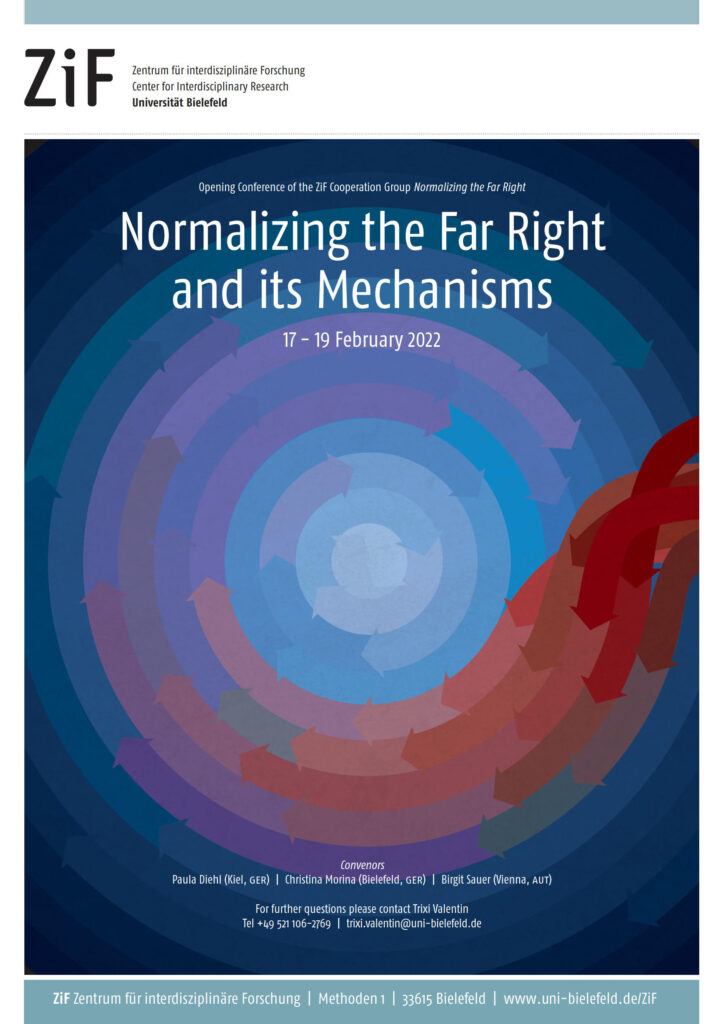Projects
Normalizing the Far Right
(Feb 2022 – Dec 2023)
In the last few years, the rise of right-wing populist and right-wing extremist parties, politicians, movements, and groups has become a common phenomenon, contributing to the spread of far-right discourse, imagination, attitudes, and sentiments. In Europe, USA, Brazil or India, far right-wing ideas – whether combined with populism or not – are penetrating democratic public spheres and deeply affecting politics and society. Far-right ideologies question and even contest key democratic principles such as plurality, equality, and human rights. They are usually located outside the realm of democracy and face strong resistance within the democratic public sphere. However, with the rise of right-wing populism in the new millennium, far-right thinking has become more and more normalized. Right-wing populists and extremists have assumed important roles as opposition parties or even government roles. This normalization of the far right is challenging for democracy, since it changes the perception of what is democratically acceptable and what is considered as “normal” – the wide spread of racist and sexist language is a good example.
How do antidemocratic ideas, imagination, attitudes, social practices, and affective politics become socially acceptable and how do they affect identity formation? Are there common normalization mechanisms that traverse all these aspects of social life? Do they pervade different realms of politics and society such as political communication, media, culture, law, 3 etc. in the same way? And what are the resistance strategies to this normalization in politics and civil society? The goal of this cooperation group is to detect the mechanisms that spread and normalize the far-right thinking, and to depict how the boundaries of the normal are shifted through the transformation of what is speakable and doable within democracy. The project is not dedicated to the study of extremism but to the permeation of the far-right ideologemes in the public sphere. This cooperation group therefore adopts an interdisciplinary perspective and works with international comparisons. We aim to promote a dialogue among international scholars in sociology, political science, law, history, media, and cultural studies. We will focus on mechanisms that normalize the far right, their effects on political culture and institutions, and also analyze democratic resilience and resistance within politics and civil society.
Since the beginning of the pandemic, the dynamics of normalization of the far right may have considerably changed and will probably continue to change. These new dynamics are not the same everywhere (Brubaker 2020). Victor Órban in Hungary and Jair Bolsonaro in Brazil, for example, have both developed very different strategies and narratives in the face of Covid-19. In addition, far-right groups are more and more joining “anti-Covid” protests around the globe. Such dynamics and manifold situations will be considered in the project. In addition, the project will carefully observe the radicalization of the far right within the public sphere after Trump supporters stormed the US Capitol. These events were highly mediated around the globe and will probably have an impact on the normalization of the far right worldwide.
Legal Notice:
Institute of Social Sciences/Political Science
Olshausenstr. 40
24118 Kiel
Represented by: Prof. Dr. Paula Diehl (Director)
Olshausenstr. 40
24118 Kiel
phone: +49 431 880-5217
mail: contact.populism@politik.uni-kiel.de
Liability for links: Our offer contains links to external websites of third parties, on whose content we have no influence. Therefore, we cannot accept any liability for any external content. The respective provider or operator of the site is always responsible for the content of the linked sites. The linked pages were checked for possible legal violations at the time of linking. Illegal content was not identified at the time of linking.However, a permanent control of the content of the linked pages is not reasonable without concrete evidence of a violation of the law. If we become aware of any infringements, we will remove such links immediately.
Copyright: The content and works on these pages created by the site operators are subject to German copyright law. The reproduction, editing, distribution and any kind of use outside the limits of copyright law require the written consent of the respective author or creator. Downloads and copies of these pages are only permitted for private, non-commercial use.
Insofar as the content on this site was not created by the operator, the copyrights of third parties are observed. In particular, third-party content is identified as such. Should you nevertheless become aware of a copyright infringement, please inform us accordingly. If we become aware of any infringements, we will remove such content immediately.
